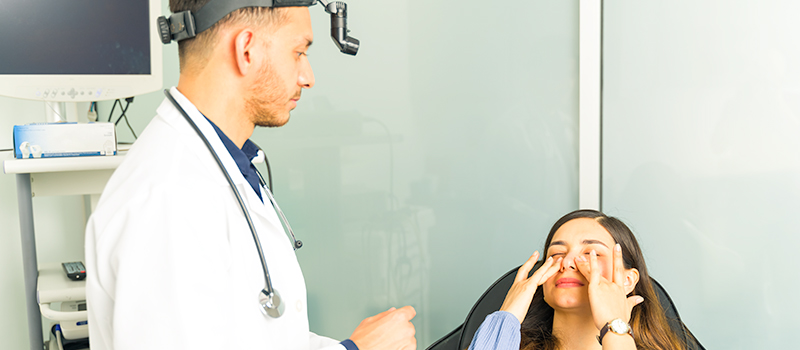Are you experiencing a severe sinus infection and wondering whether you should seek care? Or maybe you commonly get sinus infections and want to be prepared for the next one.
Either way, let’s look at important background information and treatment options so you know when to head to the emergency room for sinus infection.
What Is a Sinus Infection?

A sinus infection, or sinusitis, occurs when the sinuses become swollen, usually due to an infection. This swelling blocks mucus from draining normally, which causes a stuffy nose and difficulty breathing.
Sinus infections typically clear up on their own within a few weeks. Doctors consider them chronic when they last for more than three months.
Sinus Infection Symptoms
The most common indicators of sinus infection include the following symptoms:
- Thick and discolored mucus discharge from the nose
- Mucus drainage down the back of the throat
- Stuffiness or blockage in the nose, making breathing through the nose difficult
- A high temperature (fever)
- Decreased ability to taste or smell
- Inflammation of the nasal passages
- Pain, tenderness, and swelling around the nose, eyes, cheeks, or forehead
However, the following symptoms are also possible:

- Tiredness
- Bad breath
- Earache
- Sore throat
- Throat clearing or coughing
- Headache
- Toothache and jaw pain
Sinus infection and vomiting are also associated with each other as a consequence of post-nasal drip. Post-nasal drip occurs when mucus runs down the back of your nose and accumulates in your throat. If that excess mucus makes its way to your stomach, you may experience nausea and vomiting.
Sinus Infection Causes
Sinus infections occur when fluid builds up in the sinuses (hollow cavities in the skull). The fluid accumulation causes germ growth, which leads to infection.
Viruses are usually the cause of this fluid buildup, but bacterial infections can also be the culprit.
Certain risk factors, including these, can increase your chances of developing a sinus infection:
- Seasonal allergies
- Pre-existing structural issues within the sinuses (such as nasal polyps, or growths on the sinus or nasal lining)
- A recent cold
- A weakened immune system
- Smoking and secondhand smoke exposure
Ways To Prevent Sinus Infections
You can take precautions to reduce your likelihood of getting a sinus infection. Most of these prevention methods involve keeping your nasal passages clear:
- Stay hydrated. Proper hydration keeps mucus loose and thin.
- Breathe in steam. Take a hot shower, or stand near boiling water and inhale. Be careful not to burn yourself.
- Use a humidifier. Placing a humidifier by your bed is especially helpful in keeping your nasal passages moist.
- Rinse out your nose daily. Gently moisten your nasal passages with warm water or saline spray to clear out excess mucus.
- Treat your nose with care. Don’t blow your nose forcefully. That can irritate your nasal passages and even send more mucus back into your sinuses.
- Use nasal decongestants cautiously. Using decongestants for more than a couple days may cause increased swelling after they wear off. This puts you at risk of dependency.
- Avoid over-the-counter antihistamines. Antihistamines thicken mucus, and it’s more difficult to drain as a result. Avoid taking them unless your doctor prescribes them for allergy-triggered sinusitis.
- Elevate your head while sleeping. Propping up your head prevents mucus from pooling in your sinuses.
Sinus Infection Treatment Options
Your sinusitis treatment options depend on the severity of your infection.
Sinus Infection Home Treatment
Mild sinus infections are often treatable at home, without prescription medications or medical care. Simply take these actions:
- Get plenty of rest.
- Hydrate.
- Rinse your nose with a saltwater solution.
- Don’t smoke.
- Take over-the-counter painkillers, such as ibuprofen or acetaminophen.
- Avoid allergic triggers.
When To See a Doctor for Sinus Infection
Most people can manage sinus infections at home, and symptoms clear up within a few weeks. However, you should consider making a doctor’s appointment if any of the following statements apply:
- Your symptoms are severe.
- Your sinus infection doesn’t respond to treatment.
- You keep getting sinus infections.
- You’ve had symptoms for more than 10 days.
Depending on the severity of your symptoms, your doctor may prescribe medicines like these:
- Steroid nasal drops or spray to reduce the swelling of your sinuses
- Antihistamines if allergies are causing your symptoms
- Antibiotics if your sinusitis is due to a bacterial infection (most cases are due to viral infections), your symptoms are severe, and you’re at risk of complications
Your doctor may refer you to an ear, nose, and throat (ENT) specialist if they suspect you have chronic sinusitis.
When To Go to the Emergency Room for Sinus Infection
Instead of scheduling a doctor’s appointment, head immediately to the emergency room if you experience any of these symptoms:
- Unbearable sinus pressure
- Unbearable sinus pain
- Severe difficulty breathing
- Persistent high fever
Left untreated, sinus infection can cause serious complications, including meningitis and brain abscess.
READ MORE: 10 Common ER Visits

What Will the ER Do for a Sinus Infection?
Emergency room physicians will review your medical history and carry out a physical exam. Then, they will perform diagnostic testing to determine the underlying cause of your sinus infection.
Depending on the root cause, they will prescribe medications to prevent your infection from further weakening your body. These are two of the most common prescriptions:
- Antiviral medications for sinusitis caused by a viral infection
- Antibiotics for sinusitis caused by a bacterial infection
The physician attending you will relieve your symptoms and then work with your primary care provider for ongoing treatment.
READ MORE: Urgent Care or ER? Where Should You Go?
Head to Your Nearest Neighbors for Severe Sinus Infections
The staff at Neighbors Emergency Center is available 24/7 to treat your sinus infection and get you feeling better in no time. Don’t hesitate if you’re experiencing severe symptoms — visit your nearest Neighbors location for an evaluation.
“Very clean, bright, and inviting facility! From the moment I walked in, the staff and doctors were incredibly friendly and helpful. I almost forgot about my sinus infection!”
— Angelica Benitez

